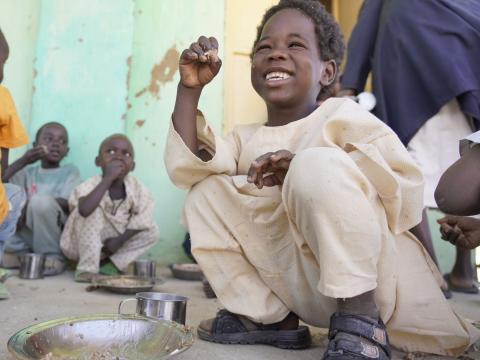Food for Education: How school meals programme is improving nutrition and children’s access to education in Sudan

In 2022, in partnership with the UN World Food Programme, World Vision Sudan implemented a school feeding programme, Food for Education, providing daily hot meals and dry take home rations to girls and boys in 266 schools in East and South Darfur.
School attendance figures were low and drop-out rates were high in the targeted schools in both states, but with the Food for Education programme parents started sending their children to school and children were also motivated to go to school.
As the hunger situation in Sudan worsens, the food provided in school is the only meal some children from vulnerable homes get each day.
According to the Head Teacher of one of the supported schools, Jabal Mara Mixed Basic School, Mr Nasor, the school feeding programme not only increased enrolment but also led to improved performance of the school. The school enrolled 1,353 students in 2022 compared to 803 students in 2021 and 694 students in 2020.
“Students that had dropped out of school re-enrolled this year because of the school feeding programme. The school did not only increase enrolment but also improved the primary to secondary school graduation pass rate from 78.9% in 2020 to 92.8% in 2022,” said Mr Nasor.
“It was hard to concentrate in class on an empty stomach. This programme has made school attractive and is saving money for my family who don’t have to spend on my breakfast anymore,” commented Remaz a grade five student at Jabal Mara Mixed Basic School.
Musa, a sixth grader at Otash Primary School, is happy about having something to eat in school. “Previously we had to leave the school after the end of the second lesson, run home for a quick breakfast then run back to school to continue with our lessons. Not everyone would make it back. I’m happy we don’t have to leave school between lessons anymore and have enough time to play and focus on our school work without interruptions,” says Musa.
Reaching over 140,000 girls and boys in East and South Darfur, the food for education programme has; contributed to reduced school drop-out rates giving more children an opportunity to learn, improved nutrition, improved school performance and addressed the immediate food gaps in homes.